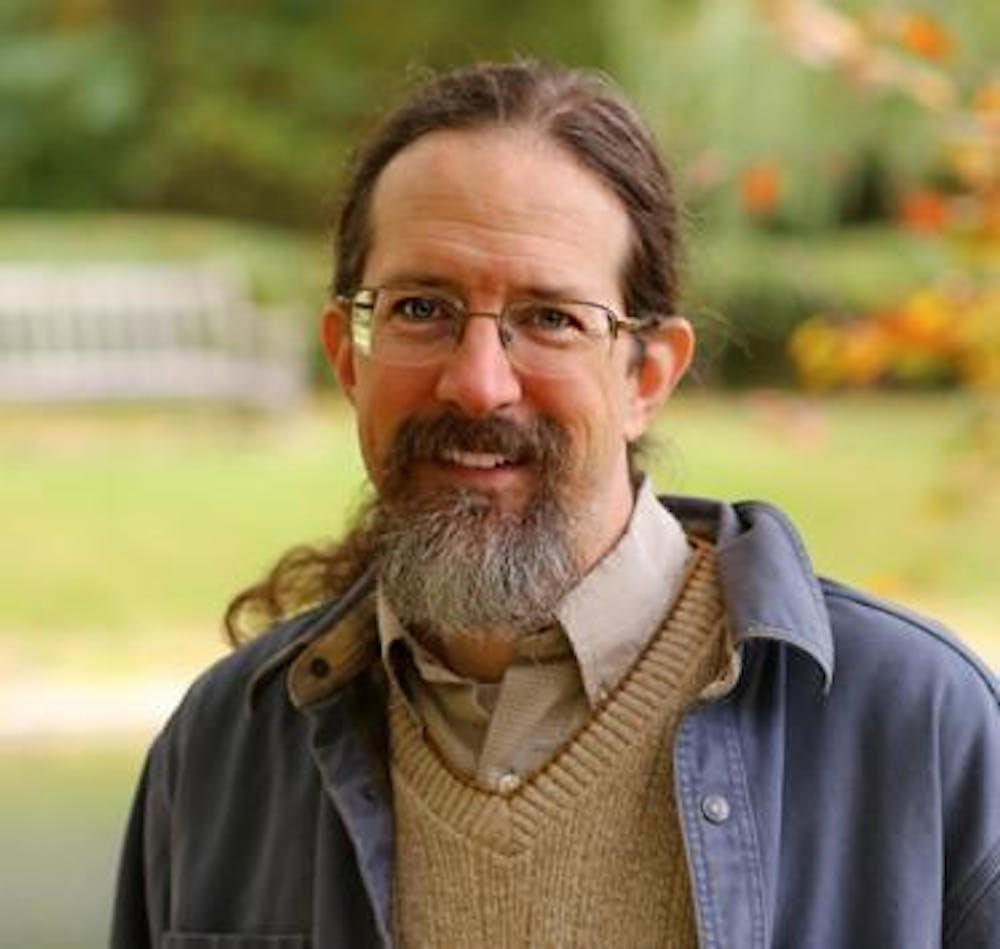Christopher Cobb, professor of English literature and director of the Sustainable Farm at Saint Mary’s College, has lived an academic career full of seemingly contrasting interests. Throughout his career, from studying at Swarthmore College and Yale University to teaching at North Carolina University and currently Saint Mary’s College, Cobb has found ways to integrate these interests into avenues of learning for students.
Cobb attended the liberal arts institution Swarthmore College for his undergraduate studies. When deliberating his degree, Cobb took a step away from literature for a semester.
“I found I missed doing it, so I said ‘Okay, that’s what I should major in,'” Cobb said.
He said took an additional two minors in history and theater.
Additional minors in history and theater later transpired into his research in Shakespearean performance.
“Academic life is pretty engrossing, so I have never felt that I had the time to get involved in theater production personally … but I integrate work with theater into my teaching in a lot of different ways.” Cobb said. “So it’s not as if I have just left the theater behind me, but the way I’m involved is different than it was when I was in high school and college. So I’ve become, in that sense, a professional watcher of theater.”
Following Swarthmore, Cobb earned a master's degree and two doctoral degrees at Yale University. In 1997, he had the opportunity to propose and teach a special topic in a college seminar, which was considered unconventional at the time of his proposal–an academic study of J.R.R Tolkien and modern fantasy.
“There was a tremendous prejudice within the academy against what we would now call genre fiction. Science-fiction, fantasy, mystery … none of those things were treated as being suitable subjects for academic inquiry,” he said. However, Cobb believed it deserved a spot. “I had 120 students apply for the 20 spaces in the class. So I knew there was an interest.”
Cobb said his teaching of Tolkien had to "overcome that prejudice." He continued to teach his class and watch as the culture shifted.
"27 years later, there are journals of Tolkien studies. There’s lots of Tolkien scholarship being written, books being published on Tolkien," Cobb elaborated.
Cobb said he continues to teach this course at Saint Mary’s.
“The way in which the scholarly landscape around this class that I’ve been teaching has changed over time. It has been really remarkable to see," he said.
Later in his graduate studies, Cobb discovered his interest in environmental studies. He explained how he didn't have the opportunity to study environmentalism in college.
"There wasn’t an environmental studies program at Swarthmore … I don’t think any of the classes of the kind that I teach now were available.”
After graduating Yale University, Cobb learned his interest in environmental studies could be taken to the academic level.
“I began to find, on the one hand, intellectual encouragement, and on the other hand, opportunities to do things that brought my teaching into an engagement with my environmental interests. And that was a very gradual process that started by thinking, just by thinking,” Cobb said.
Before teaching at Saint Mary’s, Cobb taught at North Carolina State University for six years where he created a literature of agriculture course, believing he found an absence in the curriculum he sought to fill.
“I looked around and didn’t see that the English department or the college of arts and social sciences was doing anything to acknowledge that there was an agricultural school. So I developed [the literature of agriculture] course,” Cobb said.
This process would be carried on in Cobb’s work at Saint Mary’s College.
Cobb then continued his work in English and environmental studies at the College.
“When I came to Saint Mary’s, there wasn’t, at the time, any kind of need for a course on the literature of agriculture. And so, I developed the environmental literature course,” he said.
From the course onward, he would support development of the environmental studies minor and major and later started the Sustainable Farm, an environmentally-aware organization which supports the greater South Bend area in partnership with the Center for Faith, Action and Ministry.
Cobb explained the key components to the farm are the interning and volunteer opportunities for Saint Mary’s students. The organization sponsors in-house paid internships at the College. Titled as a field supervisor, students work on “building educational materials for the farm, working on the farm’s educational mission, [and] leading tours for classes coming out to the farm.”
As an aspect of student interactiveness, academic experiential learning courses offered at the College allow students to commit hours of volunteering at the farm.
“The fundamental reason that we have a sustainable farm at Saint Mary’s College is to have a site that provides opportunities for experiential learning and sustainability,” Cobb said.
In future aspirations, “[the farm is] looking at establishing a medicinal garden that may be a resource to the nursing program.” Cobb explained this be would be in a similar vein to the Academic Experiential Learning partnerships.
When prompted for his advice to students of very many interests such as himself, Cobb said “Don’t think that just because you’re not pursuing an interest at the moment that it’s gone forever. And [do not] feel you have to always be hyper specialized, having broad interests opens up a lot of opportunities and can enable you to put things together in useful ways.”










